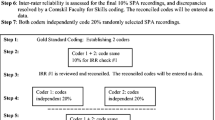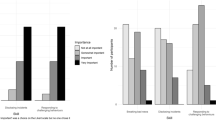Abstract
Background. Communication skills have not traditionally been included in nursing curriculum. The best educational method to improve health care providers’ practice in comunication skills is first, introduction of content, followed by continuous skills assessment and mentored feedback.Methods. A communication skills workshop using standardized patients (SPs) was planned for oncology nurse practitioner students. A 6-step development plan was used to design, implement, and evaluate the curriculum. Three patient cases using SPs were developed to represent a specific communication skill. SP teaching methodology is relatively new to nursing curriculum.Results. Four methods of evaluation revealed a high level of satisfaction with the course, a high level of communications skills demonstrated during the course, and student need to have more communication content throughout their curriculum. Confidence in communication skills increased following the workshop.Conclusions. This methodology has widespread application to other areas of cancer nursing including nurses with less oncology experience and practicing nurses on the oncology units. In addition, there is application throughout nursing curriculum for undergraduate and graduate programs. The content should be presented earlier in the curriculum and then reinforced throughout the remaining courses with clinical follow-up.
Similar content being viewed by others
References
Detmar SB, Muller WJ, Wever LD, Schornagel JH, Aaronson NK. Patient physician communication during outpatient palliative treatment visits: an observational study. JAMA. 2001;285:1351–1357.
Griffie J, Nelson-Martin P, Muchka S. Acknowledging the “elephant”: communication in palliative care. Am J Nurs. 2004;104:48–57.
Back A, Arnold R, Quill T. Hope for the best and prepare for the worst. Ann Intern Med. 2003;138:439–442.
Wenrich MD, Curtis R, Shannon S, Carline JD, Ambrozy DM, Ramsey PG. Communicating with dying patents within the spectrum of medical care from terminal diagnosis to death. Arch Intern Med. 2001;161:868–874.
Maguire P. Improving communication with cancer patients. Eur J Cancer. 1999;35:1415–1422.
Linder JF, Blais J, Enders SR, Melberg SE, Meyers FJ. Palliative education: a didactic and experiential approach to teaching end of life care. J Cancer Ed. 1999;14:154–60.
Billings JA, Block S. Palliative care in undergraduate medical education. Status report and future directions. JAMA. 1997;278:733–738.
Curtis R, Wenrich D, Carline J, Shannon S, Ambrorozy D, Ramsey P. Understanding physician’s skills at providing end of life care: perspectives of patients, families and health care workers. J Gen Intern Med. 2001;16:41–49.
Anne-Mei Them Hak T, Koeter G, van der Wal G. Collusion if doctor-patient communication about imminent death: an ethnographic study. BMJ. 2000;321:1376–1381.
Sivesind D, Parker PA, Cohen L. Communicating with patients in cancer care, what areas do nurses find most challenging. J Cancer Ed. 2003;18:202–209.
Weissman DE, Ambuel B, Norton AJ, Wang-Chweng R, Schiedermayer D. A survey of competencies and concerns in end of life care for physician’s trainees. J Pain Symptom Manage. 1998;15:82–90.
Wilkinson S, Gambles M, Roberts, A. The essence of cancer care: the impact if training in nurses’ ability to communicate effectively. J Adv Nurs. 2002;40:731–738.
Ferrell B, Virani R, Grant M, et al. Beyond the Supreme Court decision: nursing perspectives on end of life care. Oncol Nurs Forum. 2000;27:445–455.
Ferrell B, Grant M, Virani R. Strengthenning nursing education to improve end of life care. Nurs Outlook. 1999;47:252–256.
White K, Coyne P, Patel U. Are nurses adequately prepared for end of life care. J Nurs Scholarsh. 2001;33:147–151.
Kern D, Thomas P, Howard D, Bass E. eds. Curriculum Development for Medical Education: A six step approach. Baltimore, MD: Johns Hopkins University Press; 1998.
Wakefield A, Cooke S, Boggis C. Learning together: use of simulated patients with nursing and medical students for breaking bad news. Int J Palliat Nurs. 2003;9:32–38.
Kruijver I, Kerskstra A, Bensing J, et al. Nurse-patient communication in cancer care: a review of the literature. Cancer Nurs. 2000;23:20–30.
Freer JP, Zinnerstrom KL. The palliative medicine extended standardized patient scenario: a preliminary report. J Palliar Med. 2001;4:49–56.
Back A L, Arnold RM, Tulsky JA, et al. Teaching communication skills to medical oncology fellows. J Clin Orthod. June 2003: 2433–2436.
Rollnick S, Heather N, Bell A. Negotiating behavior change in medical settings: the development of brief motivational interviewing. J Ment Health. 1992;1:25–37.
Baile WF, Buckman R, Lenzi R, et al. SPIKES—a six-step protocol for delivering bad news: application to the patient with cancer. Oncologist. 2000;5:302–311.
Baile WF, Kudelka AP, Beale EA, et al. Communication skills training in oncology: description and preliminary outcomes of workshops on breaking bad news and managing patient reactions to illness. Cancer. 1999; 86:887–897.
Long F, Everett K, McGowan R. Faculty development in communication skills instruction: insights from a longitudinal program with “real time feedback”. Acad Med. 2000;75:1232–1228.
ELNEC Project, American Association of Colleges of Nursing. Available at: http://www.aacn.nche.edu/ELNEC/Graduate.htm.Accessed 22 December, 2005.
Jezewski MA, Meeker MA, Schrader M. Voices of oncology nurses: what is needed to assist patients with advanced directives. Cancer Nurs. 2003;26:105–112.
Williams SF, Medland D, Mast M. Low morale and high nursing turnover on an inpatient hematology/oncology unit at a major urban teaching hospital: improvement following strategic initiatives by nursing and medical leadership. Proc Am Soc Clin Oncol 2003;22:559. Abstract 2247.
Author information
Authors and Affiliations
Corresponding author
Additional information
Supported by the University Of Pittsburgh School Of Nursing, Dean’s Instructional Strategies Initiative Teaching Award, 2004.
Rights and permissions
About this article
Cite this article
Rosenzweig, M., Clifton, M. & Arnold, R. Development of communication skills workshop for oncology advanced practice nursing students. J Canc Educ 22, 149–153 (2007). https://doi.org/10.1007/BF03174327
Issue Date:
DOI: https://doi.org/10.1007/BF03174327




